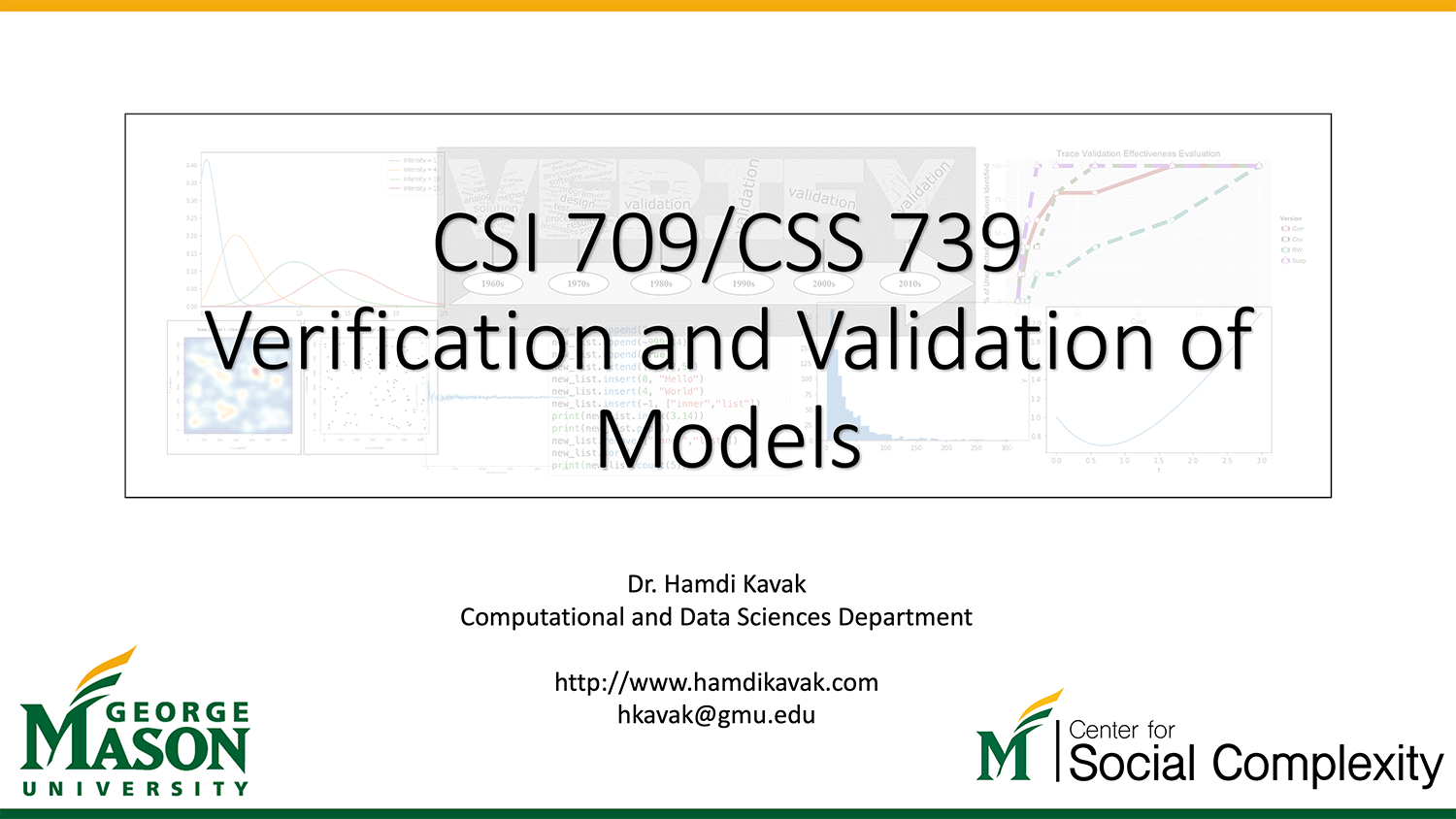Teaching
I believe teaching and research should support each other as much as possible so that both students and instructors get something intellectually stimulating. In that respect, I opted for teaching and designing classes that involve a significant research component. Currently, I am teaching three such courses at George Mason University.
- Modeling and Simulation 1 (CDS 230)
- Verification and Validation of Models (CSI 709/CSS 739)
- Spatial Agent-Based Models of Human-Environment Interactions (CSS 645/GGS 631)
Last updated on Jan 16, 2022.
Modeling and Simulation 1 (CDS 230)
Semesters offered: Fall 2019, Spring 2020, Fall 2020 (Online), Spring 2021 (Online), Fall 2021.
I will not offer CDS 230 in 2022. You can still check other professors who teach different sections. I plan to teach this class again in Spring or Fall 2023.
I am the course coordinator and instructor for the Modeling and Simulation 1 (CDS 230) course at George Mason University. In this course, students learn basic modeling and simulation concepts and get familiar with Python. The course website is located at http://hamdikavak.com/course-modsim-1/. You can watch the welcome video to learn more about this course.
Verification and Validation of Models (CSI 709/CSS 739)
Semesters offered: Fall 2020 (Online), Fall 2021

Computational models come in different forms ranging from machine learning models that predict/classify patterns to agent-based models that investigate emergent phenomena from a bottom-up perspective. Regardless of their type, all computational models should go through Verification and Validation (V&V), which checks the correctness of the model’s design and performance. The proliferation of high-level frameworks and tools make it possible to bypass or overlook V&V. This graduate-level course aims to teach and improve V&V practices. Topics of the last version of the class are provided below. Students will further their knowledge with writing assignments, paper presentations, and a final project.
Course topics:
- Models in Science
- Verification and Validation Fundamentals
- Statistics and Visualization Techniques for Verification and Validation
- Lightweight, Feedback-Driven Runtime Verification
- Computational Techniques to Support Simulation Model Validation
- Verification and Validation of Agent-Based Models
- Verification and Validation within Cognitive Modeling of Individuals
- Safer Deep Reinforcement Learning
- Validation of Machine Learning Models: Basics
- Validation of Machine Learning Models: Bias, Fairness, and Assurance
- Validation of Statistical Models
- Validation of Network Models
- Ethics of Model Design and Use
Spatial Agent-Based Models of Human-Environment Interactions (CSS 645/GGS 631)
Semesters offered: Spring 2021 (Online), Spring 2022
This course will introduce graduate students in the spatial, environmental, and computational social sciences to the use of agent-based techniques as a means of modeling human-environment interactions. Major topics include spatial processes, the use of spatial identifiers to link socioeconomic and biophysical models, and, where possible, links to geographic information and associated technologies. We will cover applications in areas such as agriculture, epidemiology, forestry, biodiversity, habitat degradation, interactions between human populations and nonhuman species, and urban modeling.
The course will combine literature review with some hands-on modeling. When demo versions are available, we will compile and run models as we review articles based on those models. In addition, students will complete a class project where they develop their own models in their areas of interest. Students with no programming background can develop simple models using NetLogo or AnyLogic. Students with advanced programming abilities are encouraged to develop more sophisticated models using packages such as GAMA, Repast, MASON, Mesa, etc., or may develop their own spatial agent-based model using the programming language of their choice.
The design of this class is based on Dr. Andrew Crooks’ Spring 2020 version.

